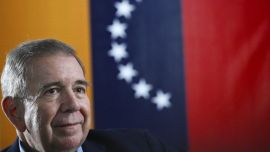Argentina joined the United States and eight other Latin American countries on Tuesday in rejecting an arrest warrant issued by a top Venezuelan court for opposition presidential candidate Edmundo González Urrutia, who claims to have rightfully won last July’s election.
In the statement, the governments of Argentina, Costa Rica, Ecuador, Guatemala, Panama, Paraguay, Peru, the Dominican Republic and Uruguay said they “unequivocally and absolutely reject the arrest warrant” issued by the court.
They described the move as “nothing more than another attempt to silence Mr. González, to ignore the will of the Venezuelan people,” arguing that it constituted “political persecution.”
“In a country where there is no separation of powers or minimum judicial guarantees and where arbitrary arrests abound, we condemn these dictatorial practices and our efforts will be firm and continuous to demand that the Venezuelan authorities guarantee the life, integrity and freedom of Edmundo González Urrutia,” concluded the text.
Minutes before the statement was issued, EU foreign affairs chief Josep Borrell also slammed the arrest warrant.
"Enough of the repression and harassment of the opposition and civil society. The will of the Venezuelan people must be respected,” he said in a post on the X social network.
Shortly after, the head of US diplomacy for Latin America, Brian Nichols, said in a post on the same social network that Washington joined “the growing list of international partners condemning this unjustified arrest warrant.”
Venezuelan prosecutors have issued an arrest warrant for González Urrutia for alleged “serious crimes” related to the elections, including the “disobedience of laws” and “conspiracy.”
Venezuela's National Electoral Council (CNE), most of whose members are friendly to incumbent Nicolas Maduro, declared the Chavista head of state re-elected to a third six-year term after July's vote – an outcome disputed by the opposition and much of the international community.
The US, EU and many Latin American countries have refused to recognise the result without seeing detailed voting results.
The CNE has said it cannot publish the records as hackers had corrupted the data, though observers have said there was no evidence of that.
González Urrutia, a retired diplomat who replaced opposition leader María Corina Machado on the ballot at the last minute, has been in hiding since shortly after the election.
Alleged ‘serious crimes’
Venezuela's prosecutor's office said Tuesday that the court had granted its request for a warrant for González Urrutia for "serious crimes."
Prosecutors said the 75-year-old’s alleged crimes stemmed from the opposition's insistence that Maduro and his allies stole the July 28 presidential vote.
Maduro has called for the jailing of both González Urrutia and Machado, who was barred by Venezuelan institutions from seeking election on charges widely dismissed as trumped up.
Machado, too, has been mostly in hiding since the vote, though she has led several organised protests against Maduro.
The opposition has published its own polling-station election results, which it says show González Urrutia won the race by a landslide.
This is at the source of the charges against him, which include "usurpation" of public functions, "forgery" of a public document, incitement to disobedience, sabotage, and "association" with organised crime and financiers of "terrorism."
"No-one in this country is above the laws, above the institutions," Maduro said on Monday in his weekly television programme.
González Urrutia has ignored three summons to appear before prosecutors investigating him, prompting Maduro to label the opposition figure a "coward" who was "leading a coup d'État from hiding."
Maduro has also blamed the opposition for the deaths of 25 civilians and two soldiers in protests that broke out spontaneously after the CNE announced his re-election to a third six-year term.
Nearly 200 people were injured and more than 2,400 arrested.
Argentina’s Foreign Minister Diana Mondino warned in a separate statement on Tuesday about the “wave of radicalisation from the regime that seeks to criminalise the Venezuelan democratic forces."
"In a context of massive violations of human rights in the face of popular protests unleashed after a crude electoral fraud, the [Maduro] regime intends to curtail the struggle for democracy and freedom, persecuting opposition leaders, who are victims of ruthless political persecution, violating all their fundamental rights in a framework of state terrorism,” read the statement.
It continued: "The Argentine Republic will not remain indifferent to the infamous actions of the Maduro dictatorship and will continue to support its people in their battle to recover democracy.”
Collapse and ‘sabotage’ claims
Since coming to power in 2013, Maduro has presided over an economic collapse that has seen more than seven million Venezuelans flee the country as GDP plunged 80 percent in a decade.
Last week, a blackout left most of Venezuela without power for hours on end in what the regime said was "sabotage" under a US-led plot to overthrow the socialist leader.
Maduro has managed to cling to power despite sanctions stepped up after his 2018 re-election, also dismissed as a sham by dozens of countries.
The United States on Monday seized the plane used by Maduro and his entourage, citing sanctions violations.
US officials took the plane in the Dominican Republic and flew it to Florida.
"Maduro and his representatives have tampered with the results of the July 28 presidential election, falsely claimed victory, and carried out wide-spread repression to maintain power by force," a US National Security Council spokesperson said Monday.
The seizure of the plane "is an important step to ensure that Maduro continues to feel the consequences from his misgovernance of Venezuela," the spokesperson added.
Maduro denounced the move as tantamount to "piracy."
Washington has had sanctions in place since 2005 against Venezuelan individuals and entities "that have engaged in criminal, antidemocratic, or corrupt actions," according to a Congressional briefing document.
These were expanded later under former president Donald Trump "in response to increasing human rights abuses and corruption by the government of Nicolás Maduro... to include financial sanctions, sectoral sanctions, and sanctions on the government."
– TIMES/AFP/NA


























Comments